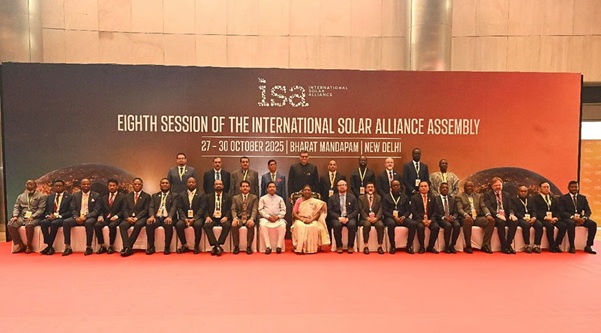
- India is hosting the 8th International Solar Alliance (ISA) Assembly from 27–30 October 2025 at Bharat Mandapam, New Delhi.
- Delegates from 124 countries and over 40 energy and climate ministers are participating.
- Main Objective — To promote global solar cooperation, expand access to affordable solar energy, and accelerate the clean energy transition.
- The Assembly is being held under the leadership of India’s Minister for New and Renewable Energy, Shri Prahlad Joshi.
“India has emerged as a leader in clean energy transition and is committed to guiding the world toward a carbon-neutral future.”
Key Highlights
|
Aspect
|
Details
|
|
Event Name
|
8th International Solar Alliance (ISA) Assembly
|
|
Organizing Body
|
International Solar Alliance (ISA)
|
|
Host Country
|
India ????????
|
|
Venue
|
Bharat Mandapam, New Delhi
|
|
Dates
|
27–30 October 2025
|
|
Participating Nations
|
124 member and signatory countries
|
|
Ministerial Participation
|
40+ Energy and Climate Ministers
|
|
Theme / Focus Areas
|
Global cooperation on solar adoption, policy alignment, technology transfer, and solar financing
|
Objectives of the 8th ISA Assembly
- Global Expansion of Solar Energy – Promote affordable and sustainable solar solutions through policy harmonization among member countries.
- Solar Financing – Develop innovative financial models for investment in developing countries.
- Technological Collaboration – Facilitate technology sharing and capacity building in solar innovation.
- Energy Equity – Ensure access to reliable and secure energy for developing nations.
- Climate Commitment – Advance carbon-neutral growth toward a “Net Zero” future.
- Sectoral Solar Integration – Promote solar energy in agriculture, healthcare, transportation, and electricity sectors.
About the International Solar Alliance (ISA)
|
Point
|
Details
|
|
Established
|
2015
|
|
Founded at
|
COP-21, Paris (France)
|
|
Founding Countries
|
India and France
|
|
Headquarters
|
Gurugram, Haryana, India
|
|
Membership
|
124 countries (107 full members + remaining signatories)
|
|
Nature
|
Intergovernmental treaty-based organization
|
|
Primary Objective
|
To promote affordable, accessible, and sustainable solar energy
|
Main Goals of ISA:
- Make solar energy a key driver of universal energy access.
- Strengthen solar financing and technological cooperation.
- Ensure energy self-reliance in developing nations.
- Realize the vision of “One Sun, One World, One Grid (OSOWOG)”.
India’s Leadership in Solar Energy
India is the founder, host, and lead nation of the ISA and plays a central role in driving the global solar revolution.
Major Achievements:
- 50% of India’s power capacity now comes from non-fossil fuel sources — 5 years ahead of target.
- The world’s third-largest solar energy producer.
- Second-largest market for renewable energy investments globally.
- Over 2 million homes have installed rooftop solar panels under the PM Surya Ghar Yojana.
India’s Key Global Initiatives:
- One Sun, One World, One Grid (OSOWOG) – A global grid concept enabling the transfer of solar energy across borders.
- Coal to Clean Initiative – India’s transition from coal-based to clean energy systems.
- ISA Expansion Drive – Collaboration and investment in solar projects with over 100 countries.
Major Solar Schemes of the Government of India
|
Scheme
|
Objective
|
|
PM Surya Ghar Muft Bijli Yojana
|
Provide affordable/free electricity by installing rooftop solar panels in households.
|
|
PM-KUSUM (Pradhan Mantri Kisan Urja Suraksha evam Utthaan Mahabhiyan)
|
Ensure energy security for farmers through solar pumps and decentralized solar plants.
|
|
Grid Connected Rooftop Solar Programme
|
Subsidies for rooftop solar panels in residential, industrial, and commercial sectors.
|
|
Scheme for Development of Solar Parks
|
Promote large-scale solar parks for enhanced power generation.
|
Expected Outcomes of the 8th ISA Assembly
- Enhanced Global Policy Cooperation – Alignment of policy, finance, and technology for solar projects.
- Investment Promotion – Increased investment flow in solar infrastructure across developing countries.
- Technological Partnerships – Expansion of solar storage and photovoltaic innovations.
- Agricultural Applications – Focus on solar irrigation pumps, cold storage, and rural electrification.
- Emission Reduction – Concrete progress toward Net Zero targets.
Significance
|
For India
|
For the World
|
|
Strengthens India’s global climate leadership.
|
Promotes collective global cooperation in solar energy.
|
|
Symbolizes energy partnership based on Vasudhaiva Kutumbakam.
|
Provides a platform for solar financing for developing nations.
|
|
Establishes India as a Renewable Energy Hub.
|
Ensures global energy security through solar adoption.
|
Possible Agenda Topics
- Solar Energy Storage Technologies
- Solar Agriculture and Rural Electrification
- Solar Transport and E-Mobility
- Solar Financing and Investment Models
- Climate Finance and Adaptation Strategies



